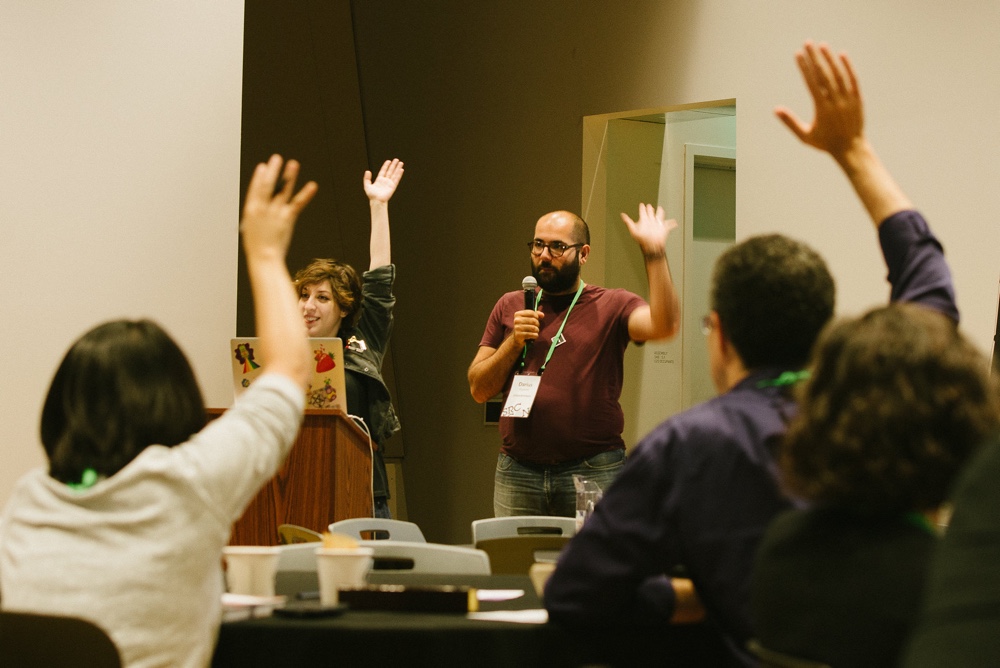Findings from the 2017 News Nerd Survey
by Erika Owens

Thanks so much to those of you who raised your hand and shared your experience in this survey. (photo/Erik Westra)
The 2017 News Nerd Survey helps us build a clearer picture of who is part of the journalism tech community and what we can do to support each other in our work. We heard from 756 news nerds from 192 organizations. Last year, we conducted the first-ever news nerd survey to help build baseline understanding of who is in this community, what we need, and how we can support one another. The responses were so helpful, we decided to make it an annual event, and this year we heard from 47% more respondents than last year—it seems you are just as curious as we are about how we work together in journalism tech!
The News Nerd Survey was made possible by the support of Google News Lab and the contributions of a community advisory group including Soo Oh, John S. Knight Fellow; Jennifer Lee, Google News Lab; and Liam Andrew, The Texas Tribune. Again, the research firm Network Impact designed the survey and cleaned, coded, and analyzed the data. We also got support from Google News Lab, which built this interactive to explore the data.
Let’s get to the data
You probably want to dive right into the data yourself! We’ve got a few different opportunities for you to check out the data this time:
- Data visualization and analysis from Polygraph and Google News Lab
- Analysis of the salary-related data from Soo
- The data itself, and an overview of the findings from Network Impact
Thank you to all of the respondents for sharing feedback on so much related to their career, background, current work, and hopes for the future. We are so grateful to get to spend time with this data and share it back with you for application in your work.
Themes and possible next steps
We found a lot that intrigued us in the survey, and encourage you to dig in and explore the data as well. Last year, Brian Hamman, who co-designed the first survey with us, pointed out how “There’s not a clear career path for where to go next” for folks in this community. Again this year, the survey reveals that truth, but we’re also seeing hints of where that trajectory might be.
- Communication and cultural challenges continue to create stumbling blocks for technical work.
News nerds may be best positioned to move into the formal leadership and management roles that would help institutionalize culture change and streamline communications. News nerds are often positioned working across teams and training colleagues to help spread tech skills. They see “overload of projects” (52% of respondents), “balancing own stories verses supporting the newsroom” (50%), and a need for "editors who are qualified to supervise the work of technologists" (39%) as the biggest challenges to using technology as a core journalistic practice. Their multidisciplinary position allows them to understand the dynamics that lead to these challenges as well as provide them with the broad base of experience to be successful at solving them.
Next steps: As an industry, we need to do more to help news nerds move into these managerial roles, and support them once they arrive.
- There are training and mentorship gaps in newsrooms, especially smaller and less well-resourced organizations.
The news nerd community itself helps to fill these gaps. Colleagues in other newsrooms provide help in steps of the data analysis and storytelling process, including with data analysis methodology review. 71% of respondents have taught, mentored, or supported someone else in the field in the last year, and 90% of respondents cite self study as important in building skills for their current work. News nerds have existing pathways for seeking support, and there is an opportunity to bolster these pathways.
Next steps: We need to bring greater visibility to existing community resources, alleviate barriers to entry, share tools to strengthen mentorship, sponsorship, and training efforts. In addition, we need to build training pathways for technical skills and for the managerial skills that will help better manage the fire hose of work.
- The journalism tech community needs diversity now.
Again, “diversity” was the most popular response to the question asking for the top three things the journalism-tech community needs now, with 29% of respondents citing it, an increase of 5% from last year. It is clear the message is getting through that people should care, but what do they need to do to address this need and more importantly, are they going to actually do it? We asked questions to dig deeper into that this year, and found 20% of respondents at a media or news company had experienced microaggressions or harassment. We also asked about a number of inclusive workplace policies, and while 64% of respondents report their newsroom offers paid parental leave only 14% report that their newsroom has salary parity. Soo’s research into salary data will also help us understand how geography and demographics influences pay, which has a huge influence on career trajectory.
Next steps: Working to institutionalize inclusive policies and practices. Again, ensuring news nerds are empowered to implement policies and make decisions that hire, support, and retain staff from marginalized backgrounds. We need ways to hold each other accountable for results and not merely intentions in these efforts.
A few notes on the data
In the interest of transparency, we want to call out some notes about the data. To start, we’re sharing overview data. We made a commitment to keep your responses confidential, and with the survey size we have, even cleaned data could allow folks to get to personally identifiable information. We don’t want to do that, and we’re thinking in the future about how we might be able to structure the survey to allow for sharing respondent-level data.
We also have some language adjustments and biases we need to address in the future. We assumed US residents were American when we asked about their race/ethnicity. We used some gender binary language (“s/he”) that we should have avoided. And we caught it after the first few hours, but we had split out “Asian American” and “South Asian or Indian American” (possibly implying South Asian Americans were not Asian American). In structuring our question about perceived harassment, we neglected to include class and sexual orientation, which were raised by several respondents in describing other examples of harassment and microaggressions. We will correct these issues in future surveys and continue to seek out feedback throughout the survey to help us make sure we’re approaching the survey itself inclusively.
Going forward
We tried to gather data that would make it easier for folks to understand what is happening in other newsrooms and be able to push for change in their own. It also helps shape our work at OpenNews and we hope other journalism organizations will find it helpful as well. On both of these points, we’re going to be reaching out to folks over the next couple of months to talk through the data and support its usage. Please reach out if you’d like to chat!
Soo will continue working with the salary and career data as part of her JSK fellowship work, so you can look out for 2-3 more pieces over the next year from Soo. It’s likely we’ll have chances to follow up on this data and the discussions it provokes at NICAR, SRCCON, ONA, and other community events in the coming year.
And right now, we have such a chance. For the next two days at SRCCON:WORK, we’re going to be delving into many of these themes. Several talks and sessions will involve what we’ve covered in the survey and participants will have a chance to use the data immediately in their sessions and conversations.
Acknowledgements
Thank you to everyone who participated in the survey. And thanks again to the whole team: The News Nerd Survey was organized by OpenNews, with the guidance of a community advisory group, the survey design and development of Network Impact, and the support of Google News Lab.
- The community advisory group includes Soo Oh, John S. Knight Fellow; Jennifer Lee, Google News Lab; and Liam Andrew, The Texas Tribune
- The Network Impact team includes Anne Whatley, Madeleine Taylor, Amanda Rounsaville Welsh
- Project management from OpenNews by Erika Owens
- The data visualization was made by Polygraph, advised by Alberto Cairo and Simon Rogers
The latest from the OpenNews team
Looking back at 2023: We spent this year creating opportunity
How we connected at SRCCON 2023, and what we're carrying into next year
Read all our news in our OpenNews blog

